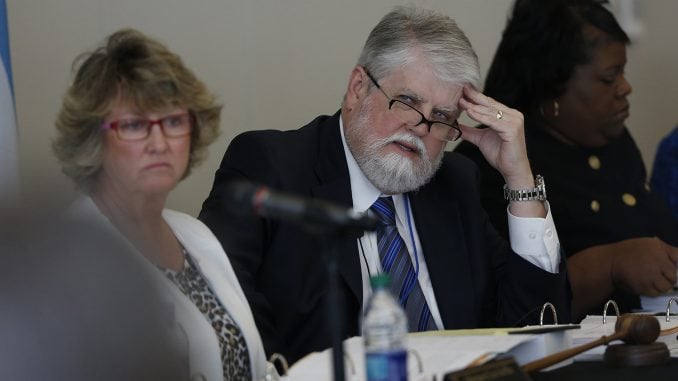
DURHAM — On Friday N.C. counties were supposed to certify their final election results, but instead, 50 of them met to address formal protests after allegations of possible voter fraud surfaced throughout the week.
More than half of the state’s counties had formal complaints filed after a week of investigating voter fraud claims. After Election Day, Attorney General Roy Cooper led Gov. Pat McCrory by less than 5,000 votes, or 0.11 percent, but the numbers shift as each county decides on challenges.
“Now we know why Roy Cooper fought so hard against voter ID and other efforts to combat voter fraud as attorney general,” said Russell Peck, McCrory’s campaign manager. “With each passing day, we discover more and more cases of voting fraud and irregularities. We intend to make sure that every vote is properly counted and serious voter fraud concerns are addressed before the results of the election can be determined.”
Most of the concerns revolve around allegations that the N.C. Democratic Party paid local political action committees to harvest absentee voter ballots and sign them on behalf of the voters.
In a protest filed by McCrae Dowless, the Republican running for Soil and Water Conservation Supervisor in Bladen County, a deposition from a Bladen County Board of Election official says he found more than 300 ballots with “overtly similar” handwriting cast in the Nov. 8 election in the county.
The ballots had write-ins for Dowless’ challenger, Democrat Franklin Graham, but also contained votes for other Democrats, including Cooper.
“With the ones found on Nov. 1, I believe there are an overwhelming number of occurrences already to review and investigate,” said James Hehl, a member of the Bladen County Board of Elections, in a letter to the N.C. State Board of Elections.
Dowless’ protest identifies five people who allegedly filled out and witnessed dozens of absentee ballots each, most without indicating required voter assistance. According to financial disclosure forms filed with the State Board of Elections, those witnesses also received hundreds of dollars for Get Out the Vote efforts from the Bladen County Improvement Association PAC, which lists the North Carolina Democratic Party as its primary donor. Since the allegations surfaced, the McCrory campaign filed protests calling to investigate absentee ballots in 11 other counties where the NCDP donated to similar PACs.
There have also been protests filed in 50 counties where the campaign says there are “known instances” of hundreds of ballots cast by suspected felons, deceased people and double voters. Because of the pending county protests, some counties decided Friday to delay certifying their final vote tallies.
The State Board of Elections was due to meet Nov. 29 to certify their results.”It is absolutely shameful that Gov. McCrory would make these unfounded claims,” said Cooper spokesman Ford Porter. “This is the worst kind of misinformation campaign meant to undermine the results of an election the governor has lost.”
Meanwhile, in Durham, officials held the Friday meeting to address a separate problem. The county Board of Elections ruled not to allow a recount of more than 93,000 early voting ballots that were submitted in the 11th hour on election night, pushing Cooper to his narrow lead. The last-minute early voting ballots were delayed reportedly because of malfunctions in the voting machines, but N.C. GOP lawyer Tom Stark argued that because the count includes allegedly corrupt data the ballots should be recounted.
What’s next? According to state law, a statewide candidate who trails by 10,000 votes or fewer after the county canvass may demand a recount. If the recount does not yield a clear winner and voting irregularities prove persistent, a more dramatic contested election could be the result.
Precedent exists for such a contested statewide election as recently as 2004. That year, Democrat June Atkinson held an approximate 8,500 vote lead over Republican candidate Bill Fletcher in the race for N.C. Superintendent of Public Instruction. After Fletcher’s challenge of the results was rejected by the courts, the legislature, with a Democratic majority, passed a law that allowed the General Assembly to decide a disputed election. While Republicans filed a lawsuit in federal court to challenge the new law, Cooper, then-Attorney General, defended it and the suit was thrown out. Subsequently, the lawmakers declared Atkinson the winner of the statewide race for superintendent.If the McCrory campaign has enough evidence of voting irregularities to call for a contested election and the race between McCrory and Cooper remains too close to call, the North Carolina House of Representatives would be the final decision-maker in who occupies the governor’s mansion for the next four years.



